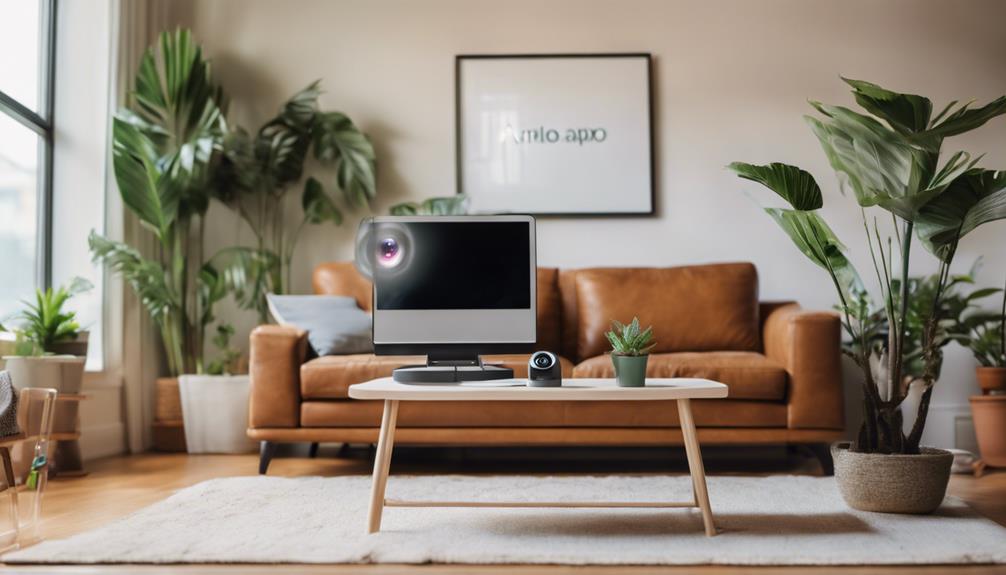Yes, home security systems can be vulnerable to hacking, which can endanger your safety and privacy. Weak passwords, outdated software, and inexpensive equipment create opportunities for intruders to breach your system. Tactics such as phishing attacks and brute-force hacking can exploit weaknesses in your security setup. Be alert for any unusual sounds from cameras or unanticipated login attempts as indications of unauthorized access. To enhance your security measures, it is crucial to utilize strong passwords and activate two-factor authentication. By following these guidelines, you can enhance the protection of your home. Interested in learning more about securing your home security?
Key Takeaways
- Home security systems can be hacked, especially when weak or reused passwords are employed.
- Phishing attacks account for over 90% of cyber attacks targeting these systems.
- Vulnerabilities in low-cost cameras, such as lack of updates, increase hacking risks.
- Signs of a hack include unusual camera behavior and logins from unknown devices.
Vulnerabilities of Home Security Systems
Home security systems face considerable vulnerabilities that make them easy targets for hackers, particularly due to weak passwords and outdated technology.
With nearly 50% of Americans using passwords of eight characters or less, your system becomes vulnerable to hacking. Hackers often employ phishing attacks, which are responsible for over 90% of cyber attacks, to gain unauthorized access to your camera feeds or accounts.
Additionally, the importance of understanding cybersecurity measures is vital, especially given recent trends in cybersecurity and ethical hacking that highlight the need for robust protective strategies.
If you rely on low-cost security cameras, be aware that many lack essential security features and timely software updates. This deficiency increases the risk of hacking, especially during installation or when using third-party monitoring services.
You might notice signs of unauthorized access through unusual camera malfunctions, like erratic movements or strange noises, indicating a potential breach.
To protect your home, it's essential to implement continuous monitoring and guarantee timely software updates. Security glitches can be exploited if left unaddressed, making regular maintenance necessary.
Common Hacking Techniques

Understanding the common hacking techniques used against home security systems is vital for protecting your property from unauthorized access.
Phishing attacks are prevalent, with over 90% of cyber attacks using this method to steal credentials and access your security camera feeds.
Hackers also deploy brute-force attacks, using automated software to guess weak or reused passwords, making it essential to set strong passwords. Additionally, the rise of AI-driven solutions has enhanced threat detection capabilities, which can help mitigate some of these risks.
Man-in-the-middle attacks pose another threat, as attackers can intercept data packets during transmission, capturing sensitive information without direct access.
Replay attacks are particularly concerning for systems like Cove and Eufy, where hackers replicate disarm signals from key fobs or keypads to gain entry.
Lastly, jamming attacks can disable your wireless security systems by blocking signals, allowing intruders to enter and exit undetected.
To enhance your security, consider using two-factor authentication, which adds another layer of protection against these common techniques.
Identifying Signs of a Hack

Noticing unusual activity in your security system can be vital for spotting potential hacks. Pay attention to your security cameras; if you hear unrecognizable noises or see erratic movements, it could indicate unauthorized access. A sudden activation of camera LED lights without your interaction is another red flag that something might be amiss.
Additionally, confirming that your home security system is regularly maintained and updated can help prevent vulnerabilities, much like keeping your home clean with professional services key factors in choosing a home cleaning service.
You should also keep an eye on your logins. If you notice any logins from unknown devices, it's a strong indication that your system may be compromised. Additionally, if you find yourself unable to access your accounts, even with unchanged passwords, that's a sign of hacking attempts.
Monitoring your data usage is essential, too. Unexpected spikes in data consumption may suggest that someone is using your security system without permission.
Impact of Hacking on Security

When hackers gain unauthorized access to your home security system, the consequences can be severe.
These vulnerabilities can also impact devices like garage door openers, allowing intruders to gain entry.
You might face privacy violations, as intruders can monitor your activities and even enter your home unnoticed.
The risks are real and highlight the urgent need for strong security measures to protect your personal space.
Consequences of Unauthorized Access
Unauthorized access to home security systems not only compromises your privacy but also heightens the risk of theft and further cyberattacks.
When hackers gain entry to your wireless security systems, they can monitor your daily activities, making it easier for them to determine when your home is unoccupied. Additionally, the integration of AI security can help enhance your home's defenses by providing robust threat detection and adapting to evolving attack vectors AI technology revolutionizes cybersecurity. This poses a significant threat to your property and personal safety.
Here are some consequences of unauthorized access:
- Increased risk of theft: Hackers can exploit knowledge of your absence to break into your home.
- Vulnerability to further cyberattacks: Hacked cameras can expose sensitive data or allow access to other connected devices.
- Monitoring service disruptions: Unauthorized access can lead to erratic camera behavior, eroding your trust in the system.
In a world where data privacy is paramount, protecting your home security system from unauthorized access is vital.
Privacy Violations and Risks
Hacking into home security systems can lead to severe privacy violations, allowing intruders to spy on your daily life and disrupt your sense of safety.
When hackers gain unauthorized access to your hacked home security cameras, they can monitor your routines, making you feel constantly surveilled. This risk is further heightened by the demand for skilled QA professionals, as best practices in software quality assurance can help mitigate vulnerabilities in these systems.
Incidents like the 2019 Ring breach, which affected over 3,000 users, show how compromised systems can severely impact personal security and privacy. With these invasions, hackers might taunt you through audio systems or capture sensitive footage, posing further risks.
Unsecured cameras can expose your private life to the public, as compromised systems may stream live footage without your consent. This lack of security around your surveillance devices creates a breeding ground for privacy infringements.
To safeguard yourself, it's essential to implement strong security protocols and regularly check for unrecognized devices connected to your network. By taking these precautions, you can help protect your home from potential invasions and maintain your privacy.
Protection Strategies for Home Systems

To keep your home security systems safe, you need to focus on strong password practices, enable two-factor authentication, and regularly update your software.
These strategies help protect your devices from unauthorized access and potential breaches.
Additionally, understanding the importance of efficient credit card processing can also enhance your overall security by ensuring secure transactions related to your home security investments.
Let's explore how each of these measures can greatly enhance your home's security.
Strong Password Practices
Creating strong, unique passwords is essential for safeguarding your home security systems against potential breaches. With nearly 50% of Americans using passwords of 8 characters or less, it's vital to adopt better practices to avoid unauthorized access.
Here are some tips to enhance your password security:
- Use strong passwords: Aim for at least 12 characters, combining letters, numbers, and symbols.
- Avoid reusing passwords: Each account should have a unique password to minimize risk.
- Utilize password managers: These tools can generate and securely store complex passwords, making it easier to keep track of them.
Two-Factor Authentication Importance
Two-factor authentication (2FA) is an essential safeguard that adds an important layer of security to your home systems, ensuring that even if your password is compromised, unauthorized access remains highly unlikely. By requiring an additional verification method, such as a one-time code sent via text or email, 2FA greatly reduces risks, especially with modern security camera systems.
Here's why you should consider implementing 2FA:
| Benefit | Description | Action Needed |
|---|---|---|
| Enhanced Security | Protects against unauthorized access | Enable 2FA on your accounts |
| Phishing Attack Defense | Shields against credential theft | Be cautious of phishing attempts |
| Password Manager Integration | Works seamlessly with secure password tools | Use a password manager with 2FA |
| Regularly Updating Settings | Keeps defenses robust against hacking | Review and update security settings |
Adding multi-factor authentication strengthens your security practices. It's not just about having a strong password; it's about layering your defenses. So, enable 2FA on your security camera systems and any related applications. Don't underestimate its significance in thwarting phishing attacks and safeguarding your home.
Regular Software Updates
Keeping your home security systems updated is just as important as enabling two-factor authentication, as regular software updates help patch vulnerabilities and safeguard against hacking attempts. By staying current with firmware updates, you can greatly enhance your system's resilience against cyber threats.
Here are some key reasons to prioritize updates:
- Patching Security Flaws: Regular software updates address known exploits that hackers often target.
- Improving System Performance: Updates can enhance the overall functionality of your home security systems.
- Mitigating Cyber Threats: Timely updates help shield your devices from evolving hacking techniques.
Make it a habit to manually check for firmware updates at least once a month. This proactive approach keeps your security cameras and systems fortified against vulnerabilities.
Remember, failing to update software regularly can leave your home security systems exposed, as over 90% of cyber attacks leverage known exploits that could have been alleviated through timely updates.
Don't underestimate the power of regular software updates; they're vital for your home's safety.
Role of Password Security

Password security plays an essential role in protecting your home security systems from unauthorized access and hacking attempts. Many people still use default passwords or weak passwords of 8 characters or less, greatly increasing the risk of breaches. To effectively secure your systems, it's important to change default passwords immediately and create strong, unique passwords for each device.
Regularly updating your passwords is also important to maintain security. Experts recommend changing them periodically to further reduce risk.
Additionally, consider implementing two-factor authentication (2FA). This method adds an extra layer of security by requiring a second form of verification, making it harder for hackers to gain access even if they possess your password.
Using a password manager can simplify this process by helping you generate and store secure, unique passwords. This reduces the likelihood of password reuse, enhancing overall system security.
By focusing on password security and leveraging these strategies, you can greatly protect your home from potential hacking attempts, ensuring your security systems remain intact.
Recent Hacking Incidents

Despite taking steps to secure your home systems, recent hacking incidents have revealed alarming vulnerabilities that can compromise your safety.
You've likely invested in wireless security cameras or DIY security systems, believing they provide adequate protection. However, these incidents show that getting hacked is a real threat.
- In 2019, over 3,000 Ring camera users faced a significant breach.
- A former ADT technician hacked customer video feeds through retained access.
- SimpliSafe was compromised when a low-cost dongle allowed unauthorized access.
These breaches highlight that the authentication required for your security systems may not be as robust as you think. A hacker only needs a small weakness to exploit, undermining your home's security.
Furthermore, the lack of professional monitoring leaves you vulnerable when incidents occur. It's essential to stay informed about these risks and consider enhancing your security measures.
Regularly updating your systems and using strong, unique passwords can help protect against these vulnerabilities. Always stay vigilant and proactive to guarantee your home remains secure.
Future of Home Security Technology

As technology evolves, the future of home security is set to embrace advanced encryption and intelligent systems that greatly enhance your safety and peace of mind. You'll likely see a shift towards wireless home security solutions, incorporating robust wireless alarm systems that utilize end-to-end encryption and the latest Wi-Fi Protected Access (WPA3) protocols.
Manufacturers are focusing on best practices, integrating two-factor authentication into their systems to prevent unauthorized access. The rise of DIY home security systems means you can self-monitor your property via mobile apps, but this also underscores the need for proper security knowledge and installation techniques.
Additionally, artificial intelligence and machine learning will revolutionize how you protect your home, offering smarter detection of unusual activities and quicker response times.
Here's a quick look at some future features of home security technology:
| Feature | Current Status | Future Outlook |
|---|---|---|
| Wireless Alarm Systems | Widely available | More integrated capabilities |
| Two-Factor Authentication | Optional in many systems | Standard across devices |
| AI Integration | Limited use | Enhanced real-time monitoring |
| End-to-End Encryption | Available in some systems | Universal implementation |
| DIY Home Security Systems | Gaining popularity | More user-friendly tools |
Frequently Asked Questions
What Home Security System Cannot Be Hacked?
You won't find a home security system that's completely hack-proof, but choosing systems with advanced encryption, regular updates, and professional monitoring can greatly enhance your home's security and reduce the risk of unauthorized access.
What 5 Home Security Systems Are Vulnerable to Hackers?
Did you know that nearly 60% of burglaries occur during the day? SimpliSafe, Ring, Cove, Eufy, and Abode Iota all show vulnerabilities, making them potential targets for hackers looking to exploit home security systems.
Can Someone Hack Into Your Home Security Camera?
Yes, someone can hack into your home security camera if you don't use strong passwords, enable two-factor authentication, or keep your software updated. Always monitor for unusual behavior to catch potential breaches early.
Can Someone Hack Your ADT System?
Yes, someone can hack your ADT system if you don't change default passwords or enable two-factor authentication. Always keep your software updated and monitor your system regularly to minimize risks and enhance security.
What Are the Risks of Home Security Systems Being Hacked?
Home security system safety considerations are essential in preventing potential hacking risks. Without proper safeguards, hackers may gain access to a home’s security system, compromising its ability to protect the property. It’s important to invest in secure, reputable systems and regularly update passwords to mitigate these risks.
Conclusion
In a world where your home should feel like a fortress, it's essential to stay vigilant against potential threats lurking in the shadows.
Just as a sturdy lock can deter a thief, strong passwords and updated security measures can keep hackers at bay.
By being proactive and aware, you can transform your home into a safe haven, where peace of mind reigns supreme.
Remember, a little effort today can safeguard your sanctuary for tomorrow.
Stay secure!









